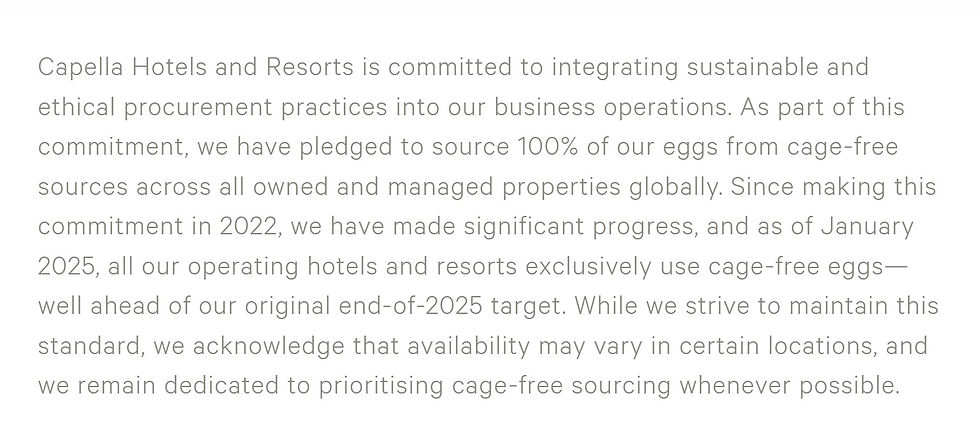2025: A Critical Year for Cage-Free Eggs — Major Global Corporations Fulfilling Commitments (Q2 Latest Progress)
- Planet For All

- Jul 18, 2025
- 3 min read
2025 marks a milestone for advancing cage-free egg welfare policies, as many companies are fulfilling their earlier cage-free egg commitments. Numerous international corporations are actively transitioning, with some already fully sourcing cage-free eggs. This year, new initiatives have also been established to monitor and assist corporate cage-free transitions. These efforts aim to drive companies to honor their cage-free commitments through actual supply chain transformation or by purchasing Cage-free Impact Incentives.
83 Major Corporations Publicly Report Progress; Some Achieve 100% Cage-Free Policy Ahead of Schedule
As of May 2025, at least 83 companies have publicly released their cage-free egg progress reports; 27 of these are globally influential multinational corporations. Viking Cruises, a global cruise company with operations spanning Hong Kong, recently stated that it has fully transitioned to cage-free sourcing. Furthermore, major international retailer REWE Group announced on its official website that over 80% of its eggs are now sourced from cage-free farms. They reaffirmed their 2025 full transition goal and promised regular progress updates. The commendable transparency and accountability of both companies set a strong precedent for the industry.

Figure 1: Viking Cruises’ Official Website.
Figure 2: Corporates that proactively report progress.
Significant progress in corporate cage-free egg sourcing is also being made in Asia. Capella Hotel Group, operating in Singapore, Taiwan, and mainland China, announced a full transition to cage-free eggs across all its properties by January 2025, well ahead of its scheduled year-end target. Aman Resorts, which operates in mainland China, Japan, and Southeast Asia, also recently announced that all its hotels and resorts, with the exception of one staff canteen, have completely transitioned to using cage-free eggs. The transitions by these two hotel groups represent a major step forward for the cage-free movement in Asia. It is hoped that more Asian companies, especially those in the hospitality sector, will follow suit and catch up with Western laying hen welfare policies.


Multiple Initiatives Established to Monitor Corporate Progress
As the 2025 deadline for cage-free egg commitments approaches, several initiatives have been established to promote accountability and transparency in corporate cage-free pledges. Accountability Lens Asia (ALA) was founded this year to oversee cage-free sourcing progress across Asia, particularly among Chinese corporations, thereby encouraging their transparency and accountability in animal welfare and sustainability policies. Meanwhile, in Southeast Asia, organizations in Thailand, Indonesia, the Philippines, and Malaysia have also launched initiatives to accelerate concrete action from local businesses on their cage-free pledges.
Figure 5: Newly Established Asian Initiatives.
New initiatives have also been established in Europe and the U.S. to further drive the implementation of cage-free policies among companies in those regions. The International Council For Animal Welfare was founded in the U.S. late last year, working through communication and cooperation with companies to promote effective and transparent approaches to improve laying hen welfare.
Impact Incentives: An Alternative for Cage-Free Transition in Corporations
Beyond traditional physical transition, Cage-free Impact Incentives offer another viable cage-free welfare policy. Administered by Global Food Partners, Impact Incentives provide a backup solution for companies facing cost and supply challenges that prevent them from achieving full physical transition. The program encourages companies to purchase credits from certified cage-free producers, which supports the cost for producers to transition to cage-free farms. Companies can therefore offset their continued use of caged eggs while steadily increasing their proportion of cage-free egg sourcing until 100% transition is achieved.
Impact Incentives enable companies to support cage-free production without immediately altering their supply chains, significantly lowering the barrier to implementing cage-free welfare policies. Major renowned corporations, such as Compass Group, Unilever, and Krispy Kreme, are already collaborating with Global Food Partners to meet their 100% transition commitment by the end of 2025.

Figure 6: Impact Incentives by Global Food Partners.
Conclusion
The first half of 2025 shows optimistic progress in global laying hen welfare. It is anticipated that more companies will follow suit this year, demonstrating their corporate social responsibility by improving their animal welfare policies. As an organization promoting laying hen welfare, Planet for All is eager to assist businesses in implementing better animal welfare policies. Companies interested in transitioning to cage-free eggs are welcome to contact us.
























Comments